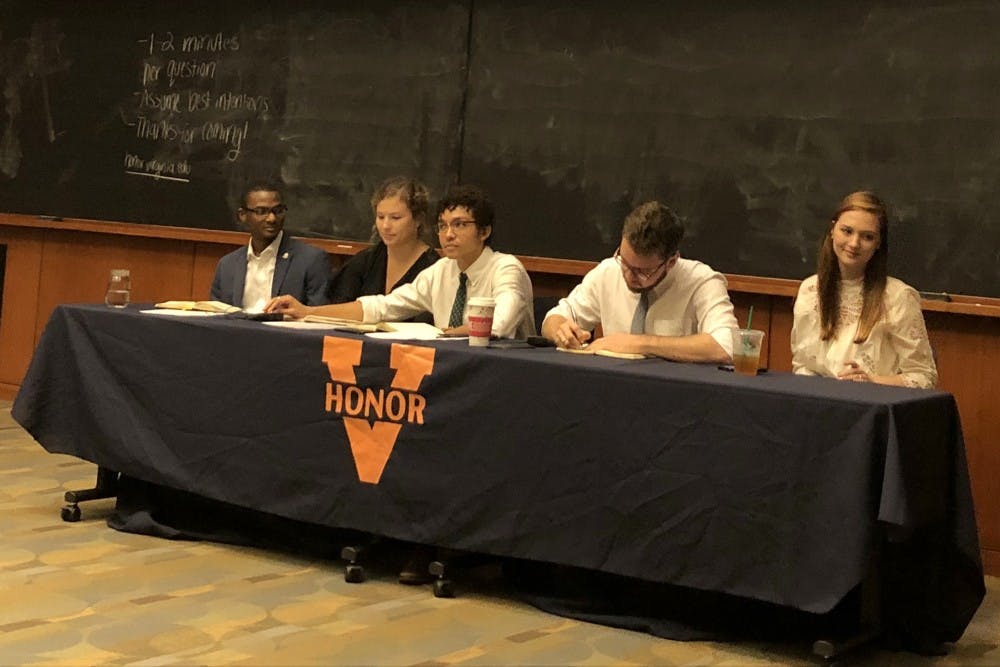The University’s Honor Committee hosted an open town hall meeting Monday night as the first part of a three-day “Popular Assembly” happening this week.
Dozens of students populated the two-hour discussion in Nau 101. It was structured with an opening address, executive board introductions, a mix of live and prepared questions that were submitted online prior to the town hall and a short conclusion.
The five members of Honor’s Executive Committee formed the panel and addressed the concerns coming from the audience. This panel consisted of Devin Rossin, a fourth-year College student and Honor Committee chair; Jeffrey Warren, a fourth-year College student and vice chair for hearings; Sarah Killian, a fourth-year College student and vice chair for investigations;Lucie Oken, a fourth-year Batten student and interim vice chair for education; and Brandt Welch, a fourth-year Engineering student and vice chair for community relations.
The town hall followed a preliminary report from the Honor Audit Commission released Sunday night that identified the three main problems facing the Honor System as inaccurate representation of the diverse student body, the notion that the Community of Trust is solely tied to Honor and a lack of buy-in from students and faculty.
The full report from the independent review commission is due in December of this year. Throughout the evening, these three issues guided and defined the discussion.
The first question concerning the issue of buy-in, particularly as it relates to faculty, came from an Engineering student. He asked what the Honor Committee planned to do to increase legitimacy, especially as some departments haven’t submitted honor offenses in decades.
“The tired adage that you can leave your backpack in the library for hours doesn’t really resonate with students anymore,” Rossin said in response. “So what does it mean to be relevant to students’ lives on the day by day? I think it means speaking to a lot of social situations they feel impacts them a lot greater than anything else. For example, we sponsored Green Dot trainings and Unpacking Privilege training for all of our support officers to make sure that they are aware of any issues that students across grounds are dealing with.”
Warren repeatedly touched upon his own evolving opinions toward the single sanction. On his application to Honor as a first year, he wrote that he was in favor of a stricter single sanction. Last month, he participated in another Honor outreach event — a debate cosponsored by the Jefferson Society about the single sanction issue. Warren was on the side of a multi-sanction system.
“Sometimes faculty can believe that their case is ironclad — that they found a very clear case of cheating — and sometimes that student is acquitted by a randomly selected jury of their peers,” Warren said. “And so I think that makes faculty not want to report to the Honor system. And then I think that those stories that faculty tell … I think that if that happens the faculty then goes to their department and tells that story.”
Another question from the audience touched on the issue of diversity within Honor, asking what the future and goals of Honor should philosophically be in the context of a system that originally had a purpose inherently tied to the ideal of a white, southern gentleman.
“I think the point of honor is to evolve over time to fit the ideals of the community that we serve,” Rossin said.
Welch specifically pointed to diversity as one of the most important goals for his term.
“I think honor being a vaguely and not super well-defined term gives us an interesting opportunity to repurpose it to fit the needs of the student body at any given time,” Welch said. “One of my goals was to make Honor an ally to communities around grounds. I think just the idea of honor, the fact that’s gone through so many phases so many times, we can shape that definition, and say alright, the reason you should care about these different communities that are going through different things is because of honor.”
Article VII of the Honor Constitution mandates that the executive board hosts an open forum every other year “to facilitate discussion on the state of the Honor System; to ascertain the pressing concerns of the community; and to generate potential measures to be put before the student body for consideration.”
This year, they planned a three day series of events. As part of Popular Assembly, there was a mock hearing Tuesday night and closing remarks with John Gates, the Engineering School’s associate dean for diversity and inclusion, on Wednesday.
Oken said Monday night’s town hall was part of a larger effort to make education events “relevant and personalized” to the wide rage of communities throughout Grounds that Honor tries to reach.
“The Mock Hearing will be a really good opportunity for students to see some of the procedural side of Honor, as well as the philosophical ideas we concentrated on in the Town Hall. Students will be able to participate in deliberations themselves, and experience what it's like to grapple with a guilty vs. not-guilty verdict,” Oken said. “On Wednesday, Dean Gates will wrap up everything we've talked about this week, and I think we'll be able to have a really honest and open conversation about the future of Honor.”







